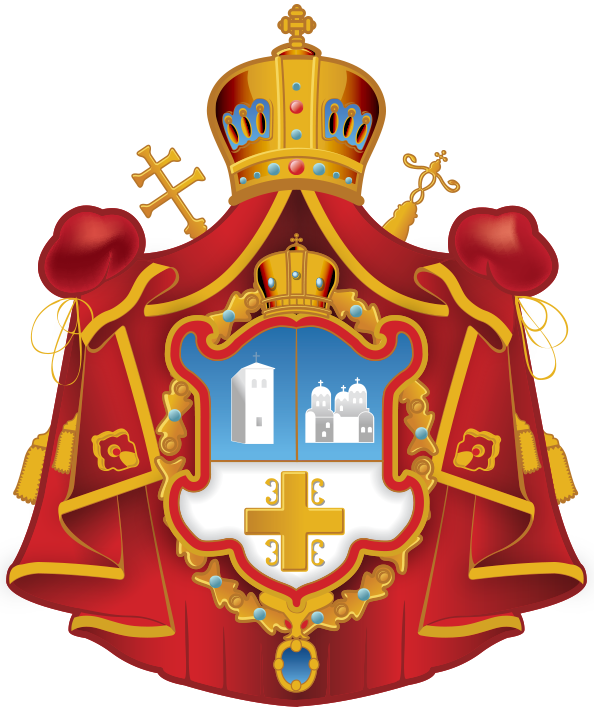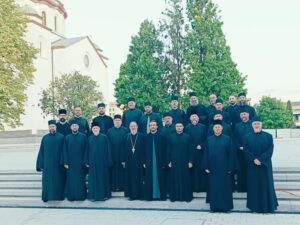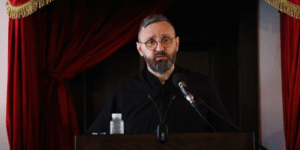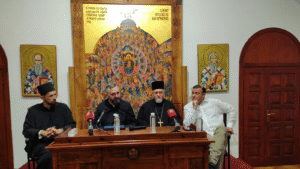“In the beginning was the Word, and the Word was with God, and the Word was God.
He was in the beginning with God.
All things were made through Him, and without Him nothing was made that was made.” (John 1:1–3)
As early as the 4th century BC, the ancient Stoics developed a doctrine concerning the logoi spermatikoi (λόγοι σπερματικοί)—seminal reasons or rational principles. They observed that the entire cosmos is permeated by these rational seeds, inherent intelligible structures within each individual thing that govern its being and development. For the Stoics, these principles accounted for the fact that we observe not chaos, but cosmos (kosmos in Greek, meaning ornament, beauty, or order).
The Holy Fathers of the Church Christianised this Stoic idea, interpreting the intelligible structure of all creation as a reflection of its Creator—the Divine Logos. One of the earliest Fathers to do this was Saint Justin Martyr and Philosopher (ca. 100–160), a philosopher who converted to Christianity and suffered martyrdom for Christ. He wore his philosopher’s cloak until the end of his life.
Through his teaching on the logoi spermatikoi, Saint Justin explained how sparks of truth could be found even among non-Christian thinkers. In his First Apology, written around 150 AD to Emperor Antoninus Pius and his son Lucius Verus, he states:
“Whatever has been well said by anyone belongs to us Christians,” because “all knowledge and truth (γνῶσις καὶ ἀλήθεια) are in Christ (παρὰ Χριστῷ ἐστιν).”
In other words, man is a rational being (logikos) precisely because he was created through the Logos and in His image (Gen. 1:26). On the other hand, all creation is intelligible and accessible to understanding; scientific inquiry is possible because every created thing bears within itself a seminal Logos—for all things were made through Him (John 1:3). The rational being—man—and the intelligible world both bear witness to their Creator, the Divine Logos, carrying within themselves these logoi spermatikoi as traces of His creative power and activity. Therefore, every human being—even those prior to Christ—is capable of discerning and expressing truth, according to their partial participation in the spermatikos Logos, as Saint Justin affirms.
That this inspired teaching of Saint Justin Martyr is true, I have come to witness personally while reading popular scientific literature, particularly in the fields of physics and cosmology. Most of the scientists whose books I have read are agnostics, though there are Christians among them—Sir John Polkinghorne, for instance—as well as atheists, most notably the charismatic Professor Richard Dawkins, whose writings have inspired many of my own.
Among the agnostic scientists I’ve encountered, one in particular has distinguished himself—not merely because I liked him (for I also liked Dawkins, even though we stand on opposite sides), but because he has truly won my admiration through the clarity of his reasoning, intellectual honesty, and a kind of inherent goodness and benevolence that shines through everything he writes. This radiance of goodness and intellectual integrity—the spermatikos Logos, to use Saint Justin’s term—I have clearly felt while reading the books of Michio Kaku.
I have previously written about him on our blog, highlighting what I consider his most beautiful argument for the existence of God, offered from a scientist’s perspective. In an interview for the Naked Astronomy podcast, Michio Kaku stated that he was raised in a Buddhist household but also received a Presbyterian Christian education (Presbyterianism being a Protestant tradition close to Calvinism). In his book The God Equation, however, he clearly identifies as an agnostic. Still, Kaku speaks with great reverence about the biblical God and Buddhist Nirvana alike. He even claims that the speculative scientific hypothesis of the multiverse could reconcile two seemingly contradictory theological claims: that the world has a beginning and that it has no beginning.
No, Michio Kaku is neither a Christian nor a believer—but the spermatikos Logos radiates from him nonetheless, for, as Saint Justin writes, “All human beings share in the Logos of God” (Πᾶσι γὰρ ἀνθρώποις μέρος ἐστι τοῦ λόγου τοῦ θεοῦ).
In addition to the aforementioned proof of God’s existence, Kaku offers yet another kind of evidence: that within every human being is planted the spermatikos Logos, manifesting in the form of intellectual clarity, honesty, and dispassionate love for truth and understanding.
This time, Kaku is not speaking about God’s existence, but rather goes deeper—he speaks about the meaning of life. And here is what the spermatikos Logos in him testifies:
“In addition to work and love, I would add two more components that give life meaning. Firstly, to fulfill the talents with which we are born. No matter how generously or sparingly fate has endowed us with abilities and powers, we should strive to develop them to their fullness, rather than allow them to atrophy and fade away. Secondly, we should strive to leave the world a better place than it was when we entered it.”
(The God Equation)
This reflection by Michio Kaku is profoundly evangelical, even though he is neither a Christian nor a believer. His words convey the very essence of Christ’s message, as presented in the Parable of the Talents (Matt. 25:14–30). Every element of that Gospel parable is present here: the unequal distribution of talents by the Master to His servants, the call to each to multiply them, the condemnation of those who bury their gifts (or, in Kaku’s words, allow them to atrophy), and finally, the multiplication of talents to their fullness, which he identifies as the meaning of life—that is, the joy into which the Master invites His faithful and diligent servants. Kaku would likely describe this as the joy of personal fulfillment.
Moreover, another key Gospel message is evident here: the world will become better if each of us personally strives to become better—or, as Kaku puts it, “to leave the world a better place than it was when we entered it.”
All of this confirms the truth of biblical and Christian anthropology. Reason (logos) and intellect (nous), according to the interpretation of the Holy Fathers, are what constitute man as the image of God. Therefore, as Saint Justin teaches, within every human person lies the spermatikos Logos, in proportion to his or her participation in the Logos.
I would say: the purer the reason, the more detached from passions it is, the greater one’s share in the Logos—and therefore, the closer one comes to evangelical truth. The admirable Michio Kaku is a remarkable example of this reality. Of course, without union with God the Logos, the spermatikos Logos within a person cannot bear its full and mature fruit. Even the subject of natural science—and science itself—cannot reach its ultimate aim, which is truth, apart from the encounter with God the Logos.
This is why scientific inquiry must remain open-ended; it requires a kind of scientific doubt. This doubt is not directed at reality itself, but at our models of reality—one of science’s most beautiful characteristics. By doubting its own representations of the world, science refuses to bow to idols; it refuses to confuse models with truth. Science, too, will find its rest and consummation in the ultimate encounter with God the Logos (logos, among other things, also meaning “science” or “rational discourse”).
Among the Fathers, it is Saint Maximus the Confessor who expresses this most exaltedly:
“For then [in the eschaton], it seems to me, having come to know the essential being of things—what they are, and how and from whom they exist—we will no longer seek knowledge by our own will, since our knowledge of everything after God [i.e., creation, the present subject of science] will have been completed. The only thing remaining for each of us will be to partake, according to our capacity, in the infinite, divine, and ineffable knowledge in which we shall have communion.”
(Ambigua, 2)
Science is like a chalice filled with a wondrous drink, which the scientist thirstily consumes. I will end with the words of the renowned Sir John Polkinghorne, a Christian and professor of physics:
“At the bottom of the glass, you will find God.”
Presbyter Dr Aleksandar Milojkov





